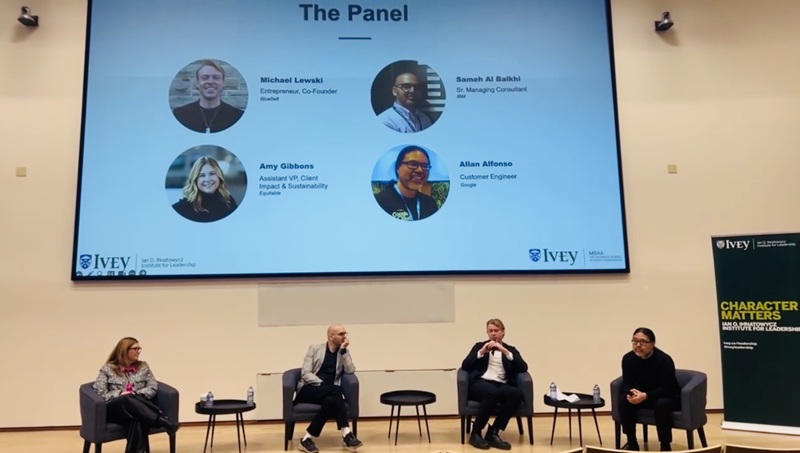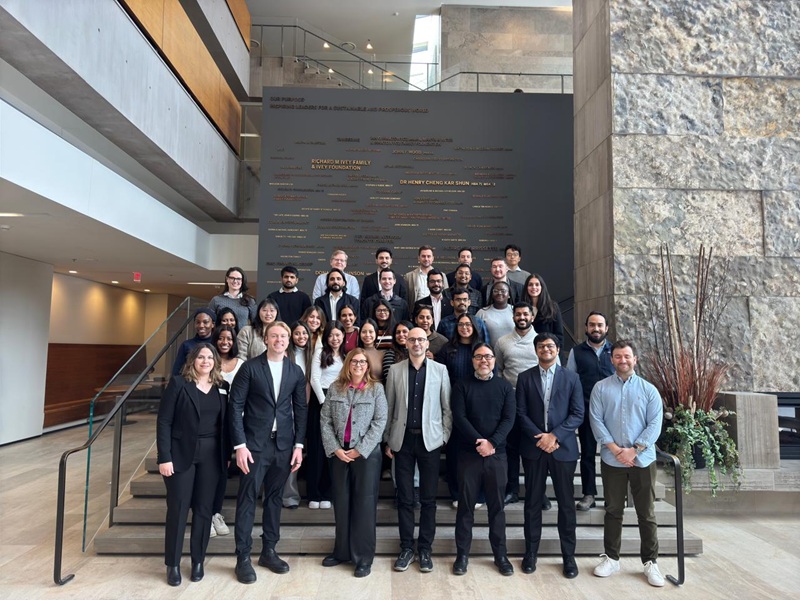In an era of rapid technological advancements and evolving workplace dynamics, effective leaders drive innovation while ensuring every team member feels valued.
Ivey’s MBA students gained insights into this multifaceted approach to leadership at the recent Ivey MBA Leadership Conference, titled Catalysts for Change – Driving Innovation and Inclusion. Organized by MBA students Heba Beshai and Kaartikeya Pandey and supported by the Ian O. Ihnatowycz Institute for Leadership, the event featured a panel discussion with four leaders from diverse sectors on why innovation and inclusion go hand in hand.
The panellists included Amy Gibbons, MBA ’08, Assistant Vice President, Client Impact and Sustainability at Equitable; Sameh Al Balkhi, Senior Managing Consultant at IBM; Michael Lewski, MBA ’23, Co-Founder and CEO of Bluebelt; and Allan Alfonso, MBA ’11, Customer Engineer at Google. Here are some key takeaways from the discussion.

The panellists l-r: Amy Gibbons, Sameh Al Balkhi, Michael Lewski, and Allan Alfonso
Artificial intelligence: Enhancing productivity and inclusivity – if used wisely
While acknowledging artificial intelligence (AI)’s transformative impact – from streamlining workflows to improving customer experiences – the panellists cautioned against deploying it without proper safeguards.
Citing AI-driven errors, such as Air Canada being forced to honour incorrect pricing due to an AI-generated mistake, Alfonso, Google’s AI expert, stressed the need for clear governance policies.
“AI is like any other powerful tool – it can be used for good or cause harm if not properly managed,” he said. “Companies must implement strict ethical guidelines and continuously monitor AI outputs to ensure fairness.”
Another growing concern is job displacement due to AI-driven automation. While AI may replace some repetitive tasks, the panellists emphasized its potential to create new job opportunities and help employees transition into evolving roles.
Gibbons noted that AI is already embedded in many workplaces – often without employees realizing it –and stressed the importance of training teams to adapt.
“When I first joined Equitable, my CEO said we would never use AI,” she shared. “But the truth is, we were already using AI-powered tools in customer service and marketing. The key is to educate employees on how AI can support their work rather than replace them.”
Al Balkhi echoed this sentiment, highlighting the need for a cultural shift.
“Focus on the proper use case and change the culture – how people perceive AI,” he said. “AI is not here to replace people, but people who use AI will replace those who don’t.”
Lewski emphasized AI’s role in equitable hiring practices, explaining how Bluebelt leverages AI to remove biases and prioritize competency-based recruitment.
“There’s a common misconception that unemployed individuals are less skilled than those currently in jobs,” he said. “AI allows us to objectively evaluate skills and competencies rather than relying on outdated hiring biases.”
Inclusive leadership: A business imperative
Beyond technology, the panellists discussed how organizations can foster more inclusive workplaces through skills-based hiring, cultural awareness, and equitable opportunities for underrepresented groups.
Al Balkhi, who identifies as a visible minority, criticized companies for over-prioritizing quotas in diversity, equity, and inclusion (DEI) programs instead of improving hiring processes.
“Quotas focus on the outcome, not the process. Instead, we need hiring processes that ensure people aren’t being overlooked,” he said.
Lewski challenged the “Canadian experience” hiring bias, noting that immigrants struggle to secure jobs because companies prioritize local experience over global expertise.
“In Canada, we have incredibly talented newcomers who are overlooked simply because their experience isn’t ‘Canadian,’” he said. “Companies that embrace diversity in hiring will have a competitive advantage.”
Gibbons stressed the importance of advocating for others and speaking up against discrimination. She shared a personal experience of confronting gender bias in the workplace, which led to meaningful change for women in her organization. Noting that the competition for talent is real, Gibbons said organizations that prioritize caring and inclusive workplace cultures will attract and retain top talent.
“Even if people have a negative reaction to DEI and ESG and all of the other acronyms we have, if you want to be here for the long term, these are the things that we need to be doing as a responsible business, and that hasn’t changed for decades,” she said. “You can call it what you want, but the fact remains that we need to create caring cultures where people feel valued, have an impact, and feel safe – that is never going to go out of style.”
Alfonso emphasized that embracing both emerging technologies and diverse, inclusive teams is a winning combination. He described how Google intentionally recruits both technologically savvy employees and those from non-technical backgrounds with specific domain expertise to bring diverse ideas to the table.
“It leads to clashes, but it’s a very healthy clash,” he said. “By bringing in people from different backgrounds and having heated debates on ideas, we ensure the best idea wins. And when the best idea wins, everyone gets behind it and we move forward.”
Advice for future leaders
Each panellist also offered one piece of personal advice for the students as they embark on their future careers:
“Be a role model. Treat others how you want to be treated.”
— Sameh Al Balkhi
“Our country consists of many groups that immigrated from elsewhere, and we have to come together. Everyone deserves an opportunity to showcase their talents. Inclusion is Canada, and it’s important for us as future leaders, managers, and executives to lead that discussion.”
— Michael Lewski
“We’ve seen multiple technological market transitions over the years – the Internet, mobile, and now AI. There will always be another emerging technology. If you can identify these shifts early, there will be opportunities to shape and be inclusive in those spaces.”
— Allan Alfonso
“Stay curious. There will be multiple transitions in your career, so you have to continue seeing yourself as a lifelong learner.”
— Amy Gibbons

Ivey's MBA students with the panellists



